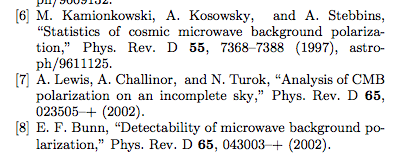I’m checking the page proofs for an article that my student Haonan Liu and I have had accepted for publication in Physical Review D. I’ve worked with dozens of undergraduates on research projects over the years, and this is by far the most substantial work ever done by any of them. Huge congratulations to Haonan! (And to my friends on admissions committees for physics Ph.D. programs: look out for this guy’s application.)
Incidentally, we submitted this article before the Open Journal for Astrophysics opened its doors, so this isn’t the one I referred to in my last post. That one isn’t finished yet.
Along with the page proofs come a few comments and queries from the editors, to make sure that the published version of the article looks correct. That document says, in part,
The editors now encourage insertion of article titles in references to journal articles and e-prints.
If you’re not in physics or astronomy, this sentence probably seems strange: how could you possibly not include the titles of articles? If you do work in physics or astronomy, you’ve probably gotten used to the fact that we generally don’t give titles in citations, but this is an incredibly stupid thing. When you’re reading a paper, and you have to decide if it’s worth the bother of looking up a cited article, the title might actually be useful information! Other disciplines include titles. I’ve never understood why we don’t. Thank you to Physical Review for this bit of sanity.
Here’s what a bit of the bibliography originally looked like:
Now it’ll be
Much better!
Of course, the standard LaTeX styles used for formatting articles for publication in physics journals don’t include article titles, so including them at this stage actually took a bit of effort on my part, but I was glad to do it. I hope other journals follow this practice. Maybe I’ll mention it to someone on the board of the Open Journal.


“Of course, the standard LaTeX styles used for formatting articles for publication in physics journals don’t include article titles, so including them at this stage actually took a bit of effort on my part, but I was glad to do it.”
Surely if PRD want this, then they should update their own LaTeX stuff, right?
Maybe I’ll mention it to someone on the board of the Open Journal.
Whisper it into your own ear? 🙂
While on the subject of references, I agree with Oren Patashnik (The author of BibTeX) that numbered references, like in PRD, are best from a stylistic point of view. However, when writing technical papers where many of the readers are familiar with many of the references, then I prefer the author-year style. If I am reading a paper on gravitational lensing, say, and there is a reference to Turner, Ostriker, & Gott (1984), I know exactly what is meant; otherwise, I have to jump to the reference list.
I think the most recent version of Revtex, PRD’s LaTeX document class, does include this as an option. I just wasn’t using the most recent version.
I agree with you about the merits of numerical and author-year style citations. The latter can be very disruptive to the reader, especially when there are multiple citations in a single sentence. But if you already know the literature, and the main authors in a field, pretty well, then author-year citations tell you a lot of the information you need right away, without going to the reference list.